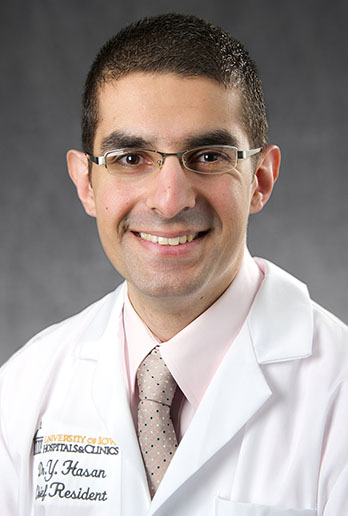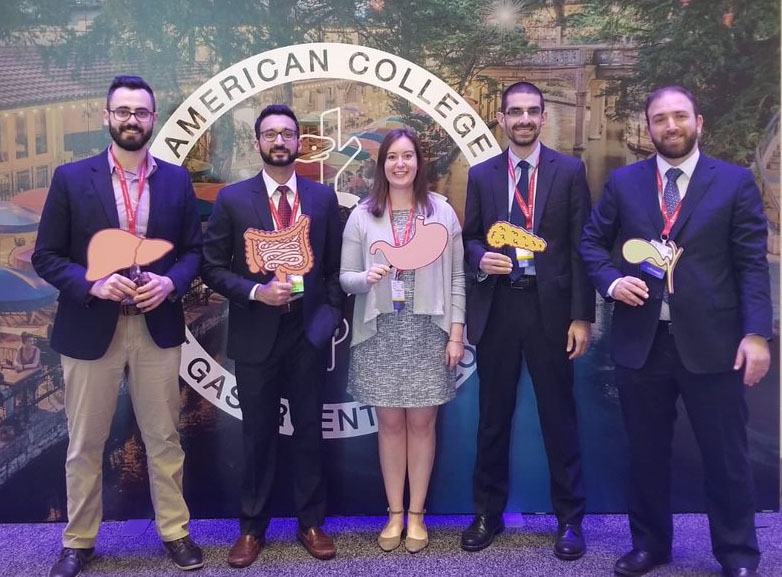Yazan Hasan, MBBS, has worn a lot of hats in his nearly ten years at the University of Iowa. A resident, a Chief Resident, a hospitalist, and now Hasan is in his second year as a fellow in the Gastroenterology Fellowship. Each role has helped him develop his skills as an internist, his ultimate goal. Even as a young adult growing up in Jordan, he said, “I always wanted to help people. Compared to working with a machine, some internal part of me has always wanted to interact with people, to help them.”
The son of a neuroscience professor, Hasan was probably destined for medicine as well. He was no stranger to the world of academic medicine, often sitting in the back while his father delivered lectures or helping him work in the lab. In medical school he came to love studying the variety of diseases, the logic of the differential diagnosis, “the thinking,” he stressed, so internal medicine seemed to be the best specialty for him. But Hasan also had his sights set on training in the United States after his mandatory year of internship in Jordan.
A number of interviews for residency were lined up all over the country, but the people, the program, and the opportunities at Iowa felt like the right fit for him. He was not confident in his interview performance, but as many others would say about him, Hasan was too modest. He easily matched at Iowa. Scott Vogelgesang, MD, was the Internal Medicine Residency Program Director when Hasan applied. “I think what stands out to me about him,” Vogelgesang said, “is his persistence. When he sets his mind on a goal, he lets nothing stand in his way to accomplish the goal. It is very impressive . . . and inspiring.” Hasan loved his time during residency, especially grateful for his mentors, rattling off a long list of members of the program leadership and other attendings he worked with. “They made me a better physician and a better person.”
 As Hasan neared the end of his second year, their example inspired him toward his next step, applying for the role of the Chief Resident in charge of education. “I wanted to work with the leadership. Each one of them had certain leadership skills, and I thought it would be a unique opportunity for me to learn from these people and continue working with them. You get to see the other side of medicine.” He had also come to enjoy working with his fellow residents. “I liked to give lectures,” he laughed. “I still do.”
As Hasan neared the end of his second year, their example inspired him toward his next step, applying for the role of the Chief Resident in charge of education. “I wanted to work with the leadership. Each one of them had certain leadership skills, and I thought it would be a unique opportunity for me to learn from these people and continue working with them. You get to see the other side of medicine.” He had also come to enjoy working with his fellow residents. “I liked to give lectures,” he laughed. “I still do.”
That impulse to soak up as much opportunity as possible also led Hasan to enroll in the Faculty/Fellows as Clinician Educators (FACE) program. He balanced the demands of his Chief Resident role with the FACE program with help from faculty. Sessions and assignments were tailored to accommodate his other requirements. “They want you to achieve your goals,” Hasan said.
Another decision point approached as that Chief year neared its end. A fellowship in Gastroenterology was calling Hasan’s name, but he had concerns about his status in the United States. Unwilling to risk traveling home to see his family in all his years at Iowa, among many other factors, Hasan felt it was time to get permanent residency status. That meant working in a faculty appointment position instead of staying on a training visa. There was time enough later, he decided, to get into a fellowship. Hasan was hired as a hospitalist at Iowa. He does not regret the “pause” in his training, ensuring the long-term viability of his time here. He described the benefit of getting to travel, but even in his career goals, he still finds benefit from his years caring for in-patients at University of Iowa Hospitals & Clinics, building his experience, his confidence, and his skills as an internist.
 And now, as a GI fellow, those skills continue to serve him. “If you want to be a good GI doctor, you have to be a good internist.” GI was an obvious choice for him, wanting a subspecialty that was procedure-based, but also an area that involves all the other body systems. “Each GI organ has a specific disease. Yet, almost all systemic diseases can affect the GI tract in several ways. From the clinical part to the procedural aspect, which can have an immediate impact on a patient’s life and the wide range of patient populations we see, GI has everything.” Hasan’s colleagues in the program value his friendship and experience. “He has a great work ethic,” second-year GI fellow Divya Ashat, MBBS, said. “His positivity and calmness rub off on patients and colleagues. He has almost superhuman powers to get through a busy day at work and still get out of the hospital on time!”
And now, as a GI fellow, those skills continue to serve him. “If you want to be a good GI doctor, you have to be a good internist.” GI was an obvious choice for him, wanting a subspecialty that was procedure-based, but also an area that involves all the other body systems. “Each GI organ has a specific disease. Yet, almost all systemic diseases can affect the GI tract in several ways. From the clinical part to the procedural aspect, which can have an immediate impact on a patient’s life and the wide range of patient populations we see, GI has everything.” Hasan’s colleagues in the program value his friendship and experience. “He has a great work ethic,” second-year GI fellow Divya Ashat, MBBS, said. “His positivity and calmness rub off on patients and colleagues. He has almost superhuman powers to get through a busy day at work and still get out of the hospital on time!”
It is good that Hasan leaves on time, because he has some people waiting for him at home: his wife, a six-year-old daughter, and now a brand-new baby son less than a couple months old. He takes his daughter to swimming lessons when he can. A big soccer fan, Hasan also often gets up very early to catch matches overseas happening in real time. Hasan believes Iowa City is the perfect place for families. “It is safe, diverse, and easy to live here.” But more than that he is grateful for the environment that the University of Iowa has provided him. “I appreciate my co-fellows, the nurses and everyone who works in this department to keep us moving every day. I am very lucky to have ended up in a great residency program, and lucky to have ended up in the perfect fellowship program. I couldn’t ask for more in my life.”


Very impressive, keep it up!
Yazan is a great clinician who cares about his patients. He always stop by Surgical Pathology to review the biopsy slides with us. This makes us veey happy.
Marshall.. Proud of you cousin ❤️
brilliant Yazoon Proud of you cousin 🙂
I knew Dr Hasan since early med school days, he showed persistance, great knowledge and sense of humor with his colleagues and patients!
Keep up the good work Yaz.
Best,
Dr Ayman
Dermatologist/Jordan